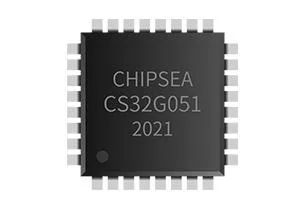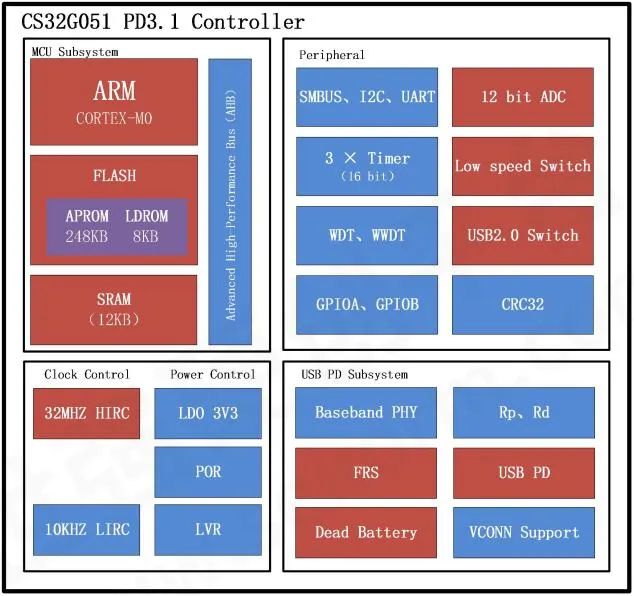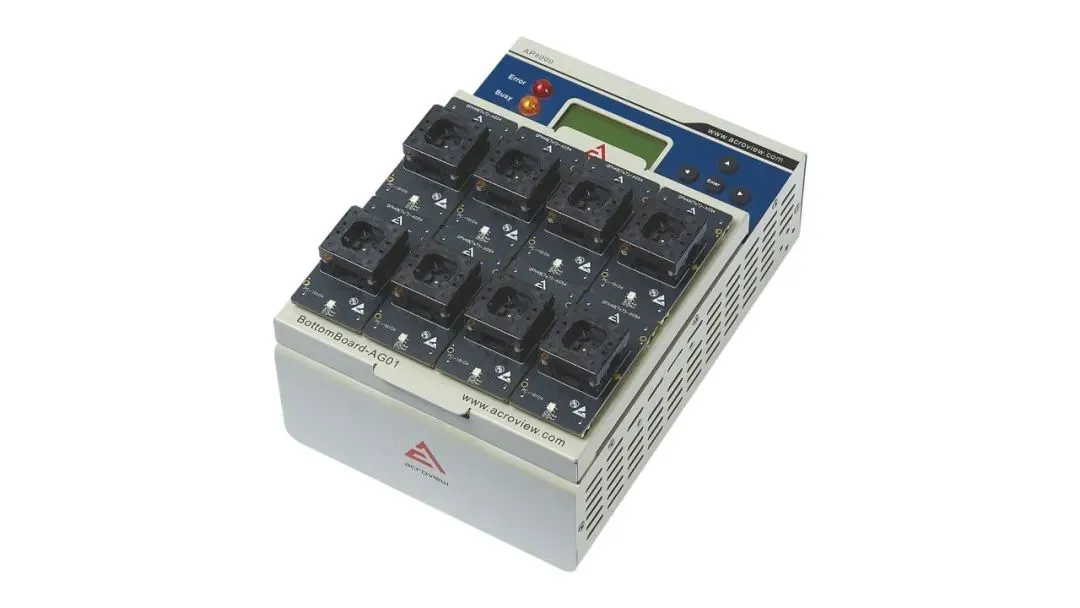Chip programming leader ACROVIEW Technology recently announced the latest iteration of its programming software, along with a series of newly compatible chip models. In this update, the 32-bit microcontroller CS32G051KCU from ChipSea Technology has been supported by the ACROVIEW universal programmer AP8000.

CS32G051KCU is a 32-bit microprocessor suitable for industrial control and applications requiring high performance and low power consumption. The CS32G051KCU operates at a frequency of 32MHz and can support a wide range of industrial control scenarios that require a high-performance CPU. It features 256K bytes of program flash and 12K bytes of SRAM.
The CS32G051KCU integrates many peripherals, such as I/O ports, timers, UART, I2C, ADC, watchdog, and low voltage detection, making it suitable for a broader range of applications. Additionally, the CS32G051KCU is equipped with ISP (In-System Programming) functionality, allowing users to upgrade firmware without removing the chip from the board.
The operating temperature range of the CS32G051KCU microcontroller is -40℃ to 85℃, and the operating voltage range is 2.2V to 5.5V. The chip offers a variety of operating modes to meet different low-power application needs.

Features
• 32-bit core, up to 32MHz
– A 24-bit system timer
– Supports low-power Idle mode
– Single-cycle 32-bit hardware multiplier
– NVIC supports 32 external interrupts, each with 4 levels of priority
– Supports Serial Wire Debug (SWD) with 2 watchpoints/4 breakpoints
• Integrated 1.5V LDO
• Memory
– 256K Flash memory for application (APROM) and system bootloader (LDROM)
– Supports OTA functionality
– 2KB data flash
– Integrated 12KB SRAM
• Supports In-System Programming (ISP) & In-Circuit Programming (ICP)
• System boot area configurable, can boot from APROM, LDROM, or SRAM
• Operating modes (low power mode, various low power strategies)
– Normal mode, operating current 10mA@5V, 25℃
– Sleep mode, operating current 2mA@5V, 25℃
– Deep-Sleep2 mode, operating current 10uA@5V, 25℃
• Reset
– Power-on reset delay 40ms
– Supports external hardware reset nRST, with built-in pull-up resistor
• LDO
– 3.3V LDO, requires external capacitor 4.7μF
• Clock Control
– 32MHz internal oscillator (HIRC) (25℃, 5V, ±1% accuracy)
– 10KHz internal low-power oscillator (LIRC)
– Peripheral module clock source configurable
• I/O Ports
– Up to 26 general-purpose (GPIO) pins
– Each I/O pin can be configured as edge/level sensitive interrupt source, with EINT0~EINT2 having one interrupt entry address, while the rest PA, PB share one interrupt entry address
– Software can configure I/O pins in the following modes
– Input mode, with internal high impedance
– Push-pull output
– Open-drain output
– All I/O pins can be configured with pull-up resistors
– Schmitt trigger input, configurable enable or disable
• Timer
– 3 16-bit timers, with 8-bit prescaler
– Timer 0/1 uses APB bus clock as timing clock
– Timer 2 can select internal 10KHz as clock source
– Supports PWM functionality
– Timer 0/1 supports capture functionality
• Watchdog Timer (WDT)
– Multiple clock source options
– Timeout reset delay period selectable
– Sleep mode or deep sleep mode supports wake-up CPU functionality
– On timeout, can choose to trigger interrupt or reset CPU
• Window Watchdog Timer (WWDT)
– 6-bit down counter, with 11-bit prescaler, can be used for a wider range of window selection
• USB PD
– 2 sets of CC ports (CC1_A/CC2_A, CC1_B/CC2_B)
– 1 independent USB PD3.1 communication module
– Supports USB PD 3.0 V1.2 protocol
– Supports PPS
– Supports FRS
• USB Type-C
– Supports Type-C V1.3 protocol
– CC1, CC2 support pull-up current sources of 80uA, 180uA, 330uA
– CC1, CC2 support 5.1K pull-down, enabled by default
– Supports Dead Battery detection
– When acting as UFP, can automatically perform charging capability detection
– VCONN MOSFETs support OCP, with load current protection at 300mA, 600mA
• FCP, SCP Host
– Supports FCP/SCP PHY layer
• SBU Analog Mux
– 1 set of SBU Switch for AUX_P/N
• USB2.0 Analog Mux
– 1 set of USB2.0 MUX for DP/DM, 2:1
– Meets 480Mbps communication requirements
• Slim UART
– 1 set of UART
– Supports single-wire communication
– Supports simultaneous data transmission and reception
– Configurable baud rate
– Supports automatic baud rate
– Both receive and transmit have 8-level FIFO, RX_FIFO(8*9Bit), TX_FIFO(8*9Bit)
– Receive interrupt supports non-empty interrupt and receive threshold interrupt
– Transmit interrupt supports transmit empty interrupt and transmit threshold interrupt
– Supports 8/9-bit data transmission and reception
• I2C
– 4 sets of I2C, 4 sets of Master/Slave
– Communication speeds supported: Low speed (100K), Fast (400K)
– 2 sets compatible with SMBUS
– Supports multi-master bus (no core master device)
– Arbitration between master devices initiating transmission simultaneously to prevent data corruption
– Supports 7-bit/10-bit addressing modes
– Programmable clock suitable for different rate control
• Analog Comparator (ACMP)
– 2 analog comparators 0~1
– With comparator offset voltage calibration function
– Each comparator has independent interrupt
– Supports programmable 8-level internal reference voltage
• Analog-to-Digital Converter (ADC)
– 12-bit SAR ADC, supports fully differential and single-ended modes
– 8+4 analog input channels
– Internal reference voltage selection: 1.22V, 2.5V, VDD
– Internal reference voltage 1.22V, 2.5V, hardware auto-calibration, post-calibration accuracy ±1%@5V, 25℃
– 100KHz SPS sampling rate
• Brown-Out Detection (BOD)
– Supports detection voltages: 2.0V/2.4V
– Supports brown-out interrupt and reset selection, 100us filtering and delay
– Allowable deviation
– 2.1V: 2.0V~2.2V
– 2.4V: 2.3V~2.5V
• Chip Security
– Provides multi-level security strategy for Flash memory
– Provides CRC-32 calculation unit, polynomial 0x4C11DB7 (same as Ethernet standard)
• CRC Calculation Unit
– Uses CRC-32 (same as Ethernet standard) polynomial 0x4C11DB7
– Operates on 8, 16, 32-bit data
– CRC initial value can be preset
– Single input/output 32-bit data register
– Equipped with input buffer to avoid affecting real-time calculations during bus stalls
– Each CRC calculation is completed within 4 AHB clock cycles (HCLK)
– Equipped with a general-purpose 8-bit register (can be used as temporary storage)
– Provides reversibility options for I/O data
• DEBUG Features
– Supports programming chips during DEBUG and can change user configurations
– 32-bit unique serial number (Unique ID)
– 128-bit unique customer ID
– Operating temperature: -40℃~85℃
– Operating voltage: 2.2V~5.5V
• Package
– QFN32

Overall Block Diagram
The AP8000 universal programmer developed by ACROVIEW Technology is a powerful programming solution that supports both one-to-one and one-to-eight configurations, providing dedicated programming solutions for eMMC and UFS, fully meeting the bare chip (offline) and on-board programming needs of the ChipSea series of chips. The AP8000 consists of three core components: the host, the baseboard, and the adapter, serving as an industry-leading universal programming platform. It not only meets the programming needs of various programmable chips on the market but also serves as the core programming platform for ACROVIEW’s professional chip programming device IPS5800S, efficiently supporting large-scale programming tasks.
The host also supports USB and NET connections, enabling networking of multiple programmers to synchronize control of multiple programmers for programming operations. The built-in safety protection circuit can instantly detect abnormal situations such as reversed chip placement or short circuits and immediately cut off power, ensuring the safety of both the chip and the programmer. The host integrates a high-speed FPGA, significantly enhancing data transmission and processing speed. The back of the host features an SD card slot, allowing users to save project files generated by PC software to the root directory of the SD card and insert it into the slot. By using the button on the programmer, users can select, load, and execute programming commands without relying on a PC, which not only reduces PC hardware configuration costs but also facilitates the rapid establishment of a working environment.
The AP8000 enhances the host’s expansion capabilities through the combination design of the baseboard and adapter, currently supporting products from all major semiconductor manufacturers, including CHIPONE, Eon, SIMCom, NORDIC, Cmsemicon, and others. The types of devices supported include NAND, NOR, MCU, CPLD, FPGA, EMMC, etc., and it is compatible with various file formats such as Intel Hex, Motorola S, Binary, POF, etc.
Company Introduction
About ChipSea Technology:ChipSea Technology, established in September 2003, is a full-signal chain integrated circuit design company that integrates perception, computation, control, and connectivity. It focuses on the research and design of high-precision ADCs, high-reliability MCUs, measurement algorithms, and AIoT one-stop solutions. Its products and solutions are widely used in industrial measurement and control, communication and computing, lithium battery management, consumer electronics, automotive electronics, smart home, smart instruments, and smart health fields.
About ACROVIEW Technology:ACROVIEW Technology is a global leader in semiconductor chip programming solutions, committed to changing the world through technology and driving the future with intelligence, continuously creating value for customers. ACROVIEW’s AP8000 universal programmer platform and the latest IPS5800S programming automation solution provide one-stop solutions for customers in the semiconductor and electronic manufacturing fields, having served leading global clients including Huawei, BYD, and Foxconn.
Scan to follow us

ACROVIEW Technology Service Account

ACROVIEW Technology Subscription Account
